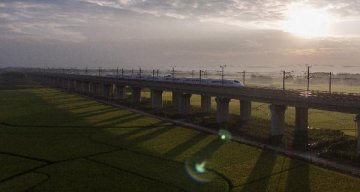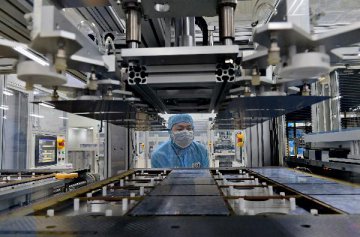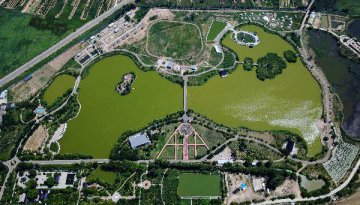
Experts said that the report of 19th National Congress of the Communist Party of China did not come up with a specific figure for the country’s economic growth as the connotations of growth are changing. The key of economic growth lies in improving its quality. The goal is new development. We must achieve sustainable economic growth on the premise of ensuring quality and efficiency. In addition, macro-regulation will be sounder in the future.
Redefine economic growth
China’s economy has been transitioning from a phase of rapid growth to a stage of high-quality development. Liu Shangxi, president of the Chinese Academy of Fiscal Sciences, said that despite the fact that the 19th National Congress report did not set a specific target for economic growth, the results have actually been given. The current economic growth rate is satisfactory. In the future, if the reform will be put in place, the system will be rationalized and mechanisms will work in a coordinated way, the economic growth will be self-evident. “If these foundations are not laid, it may well be hard to reach that goal simply by pursuing growth rates.”
Liu Shangxi said that as China's economy has come from a period of rapid growth, it is time to find a new orientation on growth rate. Economic growth depends on the potential growth rate. Yet in economic theory the potential growth rate is a controversial issue. Everyone now is measuring how much the potential growth rate in China should be. It will be an ideal case that the real growth rate is consistent with the potential growth rate. If the real growth rate is higher than the potential growth rate, the economy will overheat. If the real growth rate is lower than the potential growth rate, the potential for economic growth will not be fully realized. “Based on various measures, the potential growth rate in China is now declining, which is the result after China's economy enters a new phase. For example, some dividends that used to support China's economic growth have disappeared.”
Lu Feng, a professor at the National School of Development at Peking University and Director of Macroeconomics Research Center, said that it is not a good idea to forecast economic growth. If the forecast is not reached, that is, if the policy promises have not been reached, the government will eventually reluctantly adopt many policy instruments. This may have some drawbacks. Therefore, 19th National Congress report did not make any comments on economic growth. “Making no forecast does not mean that growth does not matter, but that the connotation of growth has changed. In the future, we must achieve sustainable economic growth on the premise of ensuring quality and efficiency. The goal of growth is new development and the key is development. Development cannot be separated from growth. Many problems in the process development have to be solved through growth. Therefore, the task of growth is still important.”
Lu Feng said that although the government makes no predictions on economic growth rate, it will predict economic changes based on the characteristics of the economic cycle. From the perspective of economic cycle, China’s economy is still in the downward cycle for adjustment, which is reflected by the decline in growth rate. It is noteworthy that the grow rate is achieved by a number of proactive macro-policies to ensure steady growth.
Zhu Baoliang, director of the Department of Economic Forecast at the State Information Center, said that the future policy orientation will change, and the country will also step up efforts in structural reform to improve the quality of economic growth. Meanwhile, it will adopt necessary fiscal policy and monetary policy to make real economic growth grow at the same pace with the potential economic growth. It is expected that the economic growth rate will slow down moderately. The economic growth rate will be around 6.3 percent in the next three years.
Macro-regulation should be sound
Li Yang, member of the Chinese Academy of Social Sciences and chairman of the National Institute for Finance and Development, said that the 19th National Congress report stressed sound macro-regulation. This concerns how to use macro-regulation. Since the global financial crisis, governments in many countries began to adopt macro-regulations in the market. But they may turn out exceeding too many of their duties. If China wants to an economic system in which the market plays a decisive role in the allocation of resources, it will be not sound if it replaces micro-entities with macro-regulation. To achieve sound macro-regulation, it should transit to a normal market status and carry out reforms as required.
Among them, the coordination of interest rates, exchange rates and yields is a problem that macro-regulation should stress as soon as possible. “First of all, it will achieve a coordinated development between monetary policy and macro-prudential policies, and then deepen the market-oriented reform of interest rate and exchange rate. Key links in the way of liberalizing interest rate has not solved yet. Meanwhile, we must clearly understand the significance of the reform of the basic elements, such as Anchorinterest rate and exchange rate. Interest rate and exchange rate penetrate every links of society. Therefore, the reform needs coordination from the environment.”
Zhu Baoliang said that the goal of policy regulation should be improving quality and efficiency and optimizing structur. In the future, we must continue to uphold the underlying principle of pursuing progress while ensuring stability, continue to maintain a proactive fiscal policy and a prudent monetary policy, unswervingly deepen the supply-side structural reforms, strive to stimulate the vitality of private investment, continue to resolve financial risks and consolidate the foundation for the sustainable economic development.
Zhu Baoliang said that the main tasks of China's economy from this year to 2020 will be taking tough steps to forestall and defuse major risks, carry out targeted poverty alleviation, and prevent and control pollution. Targeted poverty alleviation and pollution prevention need joint works of the governments, enterprises and individuals. Governments should increase financial support. Enterprises should internalize the external costs of environmental protection. On this basis, the basic direction of China's macro-economic policies will be set. The fiscal policy needs to be further relaxed to support poverty alleviation and environmental protection. Monetary policy should shift towards a tightening neutral. However, monetary tightening should not be too fast. It would be better to speed up reforms after creating a better monetary environment. Meanwhile, governments should reduce the production costs of enterprises to protect the vitality of enterprises.
Tax reform will continue to advance
Liu Shangxi said that China's tax reform will, first of all, more focus on tax fairness. The reform of the tax system should allow the market to play a decisive role in the allocation of resources, promote the formation of a unified national market and work for a fair competitive environment. The tax reform should contribute to the people's growing need for a better life and social fairness and justice. Tax reduction can be considered on some indirect taxes.
Lu Feng said that considering the internal and external situation, there is still some room for tax reform in China. The ongoing structural reforms havesome effect on tax cuts. The value-added tax, corporate income tax and personal income tax will be the focus of tax reform in the future.
As for the US’s tax reform on China's taxation system, Liu Shangxi said that China's tax system is different from that of the US. Most taxes in China are indirect taxes; while are direct taxes in the US. China has been cutting taxes in all these years. The typical case is the replacement of operation tax with value-added tax. The reform cut over one trillion yuan of taxes. In the next step, the tax relief reform will been seen in cooperate tax and personal income tax.
Translated by Coral Zhong























Latest comments